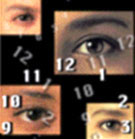

Hypnotherapy is the use of hypnosis for treating psychological and physical problems. Hypnosis is a focused state of attention which does not require that a person lose control of his/her faculties or be unaware of what is happening. By accessing the deepest levels of the mind, the hypnotherapist can effect positive changes in a person's mind and treat various health conditions.
Stress reduction is a common benefit while in a hypnotic state, as is lowered blood pressure. Hypnotherapy has a wide number of uses, including use as a substitute for anesthesia and for pain control.
![]() Return
to the menu page »
NIH Mind/Body
Return
to the menu page »
NIH Mind/Body
Hypnosis was developed by a Viennese physician, Frederich Anton Mesmer, in the late 1700s. Mesmer's form of hypnosis, called "animal magnetism," involved the distribution of magnetic fluid within the human body. He used hypnosis, which late became known as "Mesmerism," to restore balance to this magnetic fluid in the body and eliminate disease. In 1784, Louis XVI formed a commission headed by Benjamin Franklin and Joseph de Guillotin, a French physician, to investigate Mesmer's findings. although Mesmer's results with hypnosis were undisputed by the commission, the commission could not verify them. Mesmer was banned from France and Mesmerism fell from popularity.
In England, around 1843, the
Scottish surgeon James Braid investigated the phenomenon of Mesmerism and
renamed it "hypnosis," after the Greek god of sleep, Hypnos. He was
the firs person to attribute the phenomenon to psychological rather than
physical variables. His findings renewed interest in the subject, especially in
France, where hypnosis gained popularity again as a form of pain reduction
during surgery. Eventually, Braid's technique was found to be unsatisfactory,
and hypnosis drifted out of favor once again.
In the 1890s, one of the most famous proponents of hypnosis began using it in his psychiatry practice. Sigmund Freud, the father of modern psychiatry, initially embraced hypnosis but then rejected it in favor of his own theories of analysis. Hypnosis lost favor to the effective new technological and medical advances of the period. Stronger emphasis was placed upon physical treatments for effective outcomes rather than psychological treatments (which was not an organized science at the time). After much research and success, opinions had changed by mid-twentieth century, and the British Medical Association approved the use of hypnotherapy as a valid medical treatment. Three years later, in 1958, the American Medical Association followed suit.
Generally speaking, hypnosis is an artificially induced state characterized by a heightened receptivity to suggestion. The state is achieved firs by relaxing the body, then shifting attention away from the external environment toward a narrow range of objects or ideas as suggested by the hypnotherapist or by oneself in self-hypnosis.
There are two levels of hypnotic state. The patient accepts suggestions in the "superficial" state, but may not carry them out. It is in the "somnambulistic" state that post-hypnotic suggestions re most successful.
Though there are many ways fo inducing hypnosis, there are three conditions essential to successful hypnotherapy: 1) an established rapport between hypnotist and subject; 2) a comfortable environment, free of distraction; and 3) a willingness and desire by the subject to be hypnotized. Those who benefit most from the treatment are those who understand that hypnlosis is not a surrender of control; it is only an advanced from of relaxation.
A very safe practice in the hands of a qualified practitioner, hypnotherapy is a powerful tool that should be used with great caution. As with any treatment, choose a practitioner who is competently trained an certified. A person will only accept suggestions given with his permission and for his own benefit. The hypnotic process is very delicate, requiring a mixture of high patient motivation, trust and confidence in the physician, and a good measure of hypnotizability, which is present more or less in most patients. Not all patients are good subjects and are unable to reach the proper depth for post-hypnotic suggestions t be effective. It is not a cure-all. Patients with psychosis, organic psychiatric conditions or antisocial personality disorders should not try it.